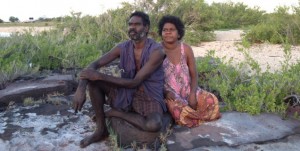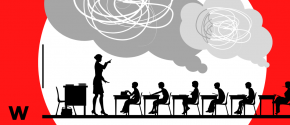Jessie Pangas, a member of the AHED Project team, explores the concept of “home” in an interview with two Yolngu couples in Galiwin’ku.
How many homes have you lived in? For me the answer is 21 and now I am not really sure where to call home. For the last two years I have lived at Ngayawili homeland, Galiwin’ku/Elcho Island, North East Arnhem Land. My family and I moved here as part of the Arnhem Human Enterprise Development (AHED) project, a not-for-profit service that supports the Indigenous people of Arnhem Land to realise the visions of hope they have for their communities. We are staying here at the invitation of the landowners and as I sit here now I am acutely aware that this has been their home for thousands and thousands of years.
Jessie Pangas
Name: Biritjalawuy and Ruwarringa
Bäpurru/Clan: Golumala and Gupapuyŋu
Homeland: Barrkira and Djiliwirri
Place of Residence: Galiwin’ku, Elcho Island
What does home mean to you?
Home. Yirralka (home/estate). It’s where you belong. There are salt water people, billabong people, plain country people that all belong to a certain type of land. And there are markings in the land, rock, vegetation, river, mountain, hill that mark the boundaries. Yolŋu people know where the markings are. It is all recorded in the manikay (songlines). That is how people mark the boundaries and how they teach their children and then the teaching carries on down the generations and then we know. You own all that story. They are yours, manikay (song lines), history, rom (law), kinship. All that connects you to your land.
It is where you are connected. All the different lands are related to each other. Even if you are visiting there is a place there in which you can feel at home. Everyone knows that connection and it feels like you know people even if you have not met them before. Everything is connected.
It is where you feel safe. We feel protected in our Yirralka. Anywhere you went in Arnhem Land there would always be a place were you could feel safe and at home.
It is not a building or a fence, it is the land. You can build a hut, a wäŋa, and then it is gone. It goes back into the soil. It’s not the permanent one, the permanent one is the land.
It is part of our law (rom). When God made Adam, he put Adam in Eden and there was a rom that God had given him to look after the land, to cultivate and to harvest (Genesis 2:15). He didn’t put him elsewhere and then go wander around and discover where Eden is. It fit us where God put us. That rom is there, the God given rom to care for the land. We did that. We cultivated and we harvested. We took only a little fish. Just enough to feed the family. So you have got plenty at your home there on your table. You don’t run out.
Home is a place of plenty.
Do you live on your homeland?
People lived there in the old days before the Missions, before contact. When the Balanda (dominant culture Australians) came, they brought us into one Yirralka. The old system was replaced with lot numbers and applications.
I live in Galiwin’ku (Elcho Island) but I have entitlement on my homeland. I feel safe and have that “at home” feeling – not the house but the land. I lived at Barrkira (my homeland) for 5 years from 1998 to 2002. My Mum and Dad developed a small homeland there but we had to move when my dad got Ross River fever. Ruwarringa only visited his Yirralka for the first time last year and only for a few hours. He was crying. He felt it. He knows the history and all the story about that land from the songlines. When he went there it felt different. “I was feeling that my old people were living (he felt the presence of his ancestors), my father, grandfather,” he said. “That’s what I feel, and I cried.”
Do you think the Yolŋu understanding of home is changing?
Old people who have lived in the old times feel homesick for their Yirralka in Galiwin’ku. But now we are stuck in one place. Dragged out from our own Yirralka. The new generation, us mob, have been born and growing up in a different country. Now we feel at home in Galiwin’ku. Maybe there is not enough teaching happening about land. Maybe they have never been to their own Yirralka. We were forced into that new way of living and now we are stuck here because of other influences and here we are living in a different order. It has confused our idea of home.
Before we just had the big land and the rubbish was not plastic and steel but leaves, wood and shell and it returned to the land and we moved around. Everything was seasonal. We still have that inside but we are not sensing it. Everything is not in order now, that is why there is big problems at home. That order is not in place. How can we enter into Balanda way of living when we don’t have that inside us? People are getting sick from living in one house, not moving around where there is wind and sun. All that knowledge is disappearing. Home management is very poor. We haven’t got that knowledge to live the new way. For the young people, what is there is all that they have and there is not much there. They have gained some education, but not enough. They don’t know the old way and they haven’t found the new way, so they are stuck in the middle with all that confusion and hopelessness.
We feel different. We feel sad. We think that this way of living is the only way for us. The Balanda way. We are somewhere here, in the middle, confused. Not knowing this law or estate rom and also not having access to the Balanda knowledge because we are lost somewhere in the middle. If we go back to the old ways and learn the knowledge, that will build respect, self esteem, everything, restore the order and learn about the rom.

Name: Banythay and Ganalarritj
Bäpurru/Clan: Warramiri and Djambarrpuyŋu
Homeland: Ban’thala
Place of Residence: Ban’thala
What does home mean to you?
Ban’thala is my home. It is the homeland of my mother. I belong to this land. My body is owned by this land. Like in the Genesis story, Adam was made from the dirt; so my body belongs to this dirt because it will return to it. But not just the dirt, but the sea also. For Yolŋu, home is both land and sea.
Here I have more control over my own life. I can work, I can feed my family and I have more control over the influences on my family. I am my own person.
It is a place where my children can grow up healthily. Eating the good food from the land and the sea, working in the garden instead of sitting around doing nothing, and being connected to the land, family and their history.
It is a place for work. When we moved to Ban’thala I had a vision to provide work for my people and I started a garden. I want to provide work for my family and good food. We want to be self sufficient, working our own land, and I want others to come and work with me.
It is a place of rest. When I am in town it is like I have a heavy weight on my shoulders. When I come home it is gone.
Do you live on your homeland?
My grandfather lived here and in the surrounding area but we were both born and grew up in Galiwin’ku in the Mission days. We went to school there, we worked there. But I could see that things were not going well in town. It is not how we are meant to live like that, so many clans living together in one place. That is why there is so much trouble, the fighting, the influences. We each have our own homeland and we should be living there on our own land with our families. I could see that it was not good and that there would be no jobs for Yolŋu in four, five years and so I decided to move here, to Ban’thala. I had to talk to Ganalarritj about it. At first she didn’t want to come, but then she came. It was the year 2000. There was another family group living here in the 80’s but when that old man got sick and had to go into town for medical treatment, the whole family moved in with him. We have had other people living with us here at Ban’thala over the years, but people get stuck in town. We have to go into town for ŋatha (food), bunggul (ceremony surrounding death in the community) and medical treatment, but then people get stuck there under the many negative influences that hold them there – dependency, depression, hopelessness, gambling and addictions.
Do you think the Yolŋu concept of home is changing?
We are always telling our family, come out to Ban’thala. Come and live on the homelands and be your own person. Have more control of your life. But they say: “What for?” Even now Yolŋu are asking us: “What is a homeland?” They have lost their own story. Even our own people do not understand our vision. They are sitting there playing cards and they do not see what is happening. They are asleep. We want a healthier life for our family and children. We do not want them to grow up with the influences of town, but to be here at Ban’thala, working in the garden, hunting and going to school at Gawa (the neighbouring homeland where there is a small Christian school where Ganalarritj works). Whenever we are in town we always ask our family to come to the homelands, but they don’t understand. I hope that one day they will see what we are doing and want to join us.

Jessie Pangas is a member of the AHED Project team with her husband Benjamin. They have two young children and as a family they drove up to Arnhem Land from Tasmania to join the project in 2011. Jessie has been adopted into the Yolngu kinship system by Biritjalawuy.
This article is also published in TEAR Australia’s Target magazine, Issue 2, 2013.




Royden Rogers •
A very insightful interwiew …. I am currently travelling in Kakadu and learned just yesterday from a park ranger of the concepts of kinship and land connection of the aboriginal people.
I can appreciate Biritjalawuy and Ruwarruga’s frustration with many of their indigenous family members being ‘stuck’ between cultures. It’s discouraging to recognise that little progress is being made in Australia to assist or enable aboriginal people to take on a healthy and sustainable identity – either traditional, evolved, or modern.
Sam Braid •
Excellent interview to read. The opinions are so well articulated and are of substance. Thank you interviewer and interviewees alike.
Ben g •
Such a great interview! I loved how those guys see themselves part of God’s ‘Genesis’ story. I loved hearing about people’s connection with the land, and how they can feel a part of home anywhere in Arnhemland through their connections of song lines and kinship. You should do more interviews on other topics Jessie.